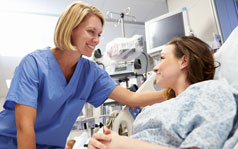10th June 2024
What are the most common conditions seen in our Emergency Department?
When an emergency occurs at home, sometimes it can be difficult to decide whether it’s the right time to contact your GP or more appropriate to attend an Emergency Department instead.
In our Emergency Department, there are certain cases or conditions we see more often than others, which is why we’ve put together the following guide to help determine when you may need to seek medical attention.
.jpg?sfvrsn=2f5a36a_1)
Fever
Simple fever can be managed at home with over-the-counter medications, such as paracetamol.
Coughs and colds
Viral chest infections/flu can be managed at home with over-the-counter medications, fluids and rest.
Contact your GP if the condition persists for more than five days or you develop shortness of breath, chest pain, greenish/yellowish sputum and/or fever not responding to paracetamol.
Contact the Emergency Department if you’re having difficulty breathing.
Chest pain
Contact your GP for chronic pain.
Contact the Emergency Department or Urgent Cardiac Care for acute pain.
Chronic pain develops over a long period of time, while acute pain is severe and sudden.
Abdominal pain
Contact your GP if you experience abdominal pain but can tolerate food and drink.
Contact the Emergency Department if you are experiencing persistent vomiting, diarrhoea, blood in stools, and severe pain.
Emergency Department
Mater Private Emergency Departments in Dublin and Cork provide fast rapid access to our dedicated and specialist emergency teams when you need it most.
Learn more.jpg?sfvrsn=bdbc3e72_0)
Urinary tract infection
Contact your GP if you are experiencing pain during urination, mild blood in urine, foul smelling urine or cloudy urine.
Contact the Emergency Department if you notice blood in your urine (your urine is red in colour), you are unable to pass urine, or experience severe flank pain with urine infection (pain in either side of your lower back).
Shortness of breath
Contact your GP if you have asthma or chronic obstructive pulmonary disease and have shortness of breath but can still speak in sentences.
Contact the Emergency Department if you are unable to speak in sentences, wheezy, turning blue, your medication (inhaler) is not working, or you have low oxygen levels.
Minor injuries
For minor cuts, wash the wound thoroughly with soap and water, elevate the limb, and apply pressure to stop bleeding and ice to stop swelling.
For minor injuries, contact the Emergency Department or a minor injury clinic.
For major injuries (unable to stop the bleeding or are suffering from a dislocation/fracture) contact the Emergency Department immediately.
Fracture & trauma clinic
We now offer a safe and effective pathway for assessing fracture/trauma injury in our Emergency Department in Dublin. We triage upper and lower limb injuries such as clavicle fractures, elbow and wrist fractures, soft tissue knee, foot and ankle fractures, Achilles tendon ruptures, and other soft tissue injuries and non-complex fractures.
By attending our fracture/trauma clinic, patients will have access to orthopaedic surgical and musculoskeletal physiotherapy consultation and review, initial treatment, and an agreed care plan.
Mater Private Network Emergency Department
Dublin: Tel: 1800 222 999 Email: emergency@materprivate.ie | Opening hours: 8am – 7pm, Every Day
Cork: Tel: 021 601 3333 Email: mpced@materprivate.ie | Opening hours: 8am – 8pm, Monday to Friday
Mater Private Network Urgent Cardiac Care
Dublin: Tel 1800 247 999 | Opening hours: 24 hours a Day, Every Day
Cork: Tel: 021 601 3326 Email: corkcardiology@materprivate.ie | Opening hours: 8am – 8pm, Monday to Friday
The above content was reviewed by AnaJoy Dizon, Clinical Nurse Specialist at the Emergency Department in Dublin.







.jpg?sfvrsn=bc97231b_1)


.jpg?sfvrsn=b7c28e80_1)
.jpg?sfvrsn=51b28ca9_1)
.jpg?sfvrsn=f05de223_1)
